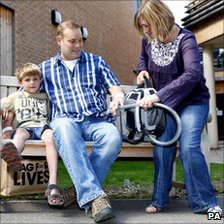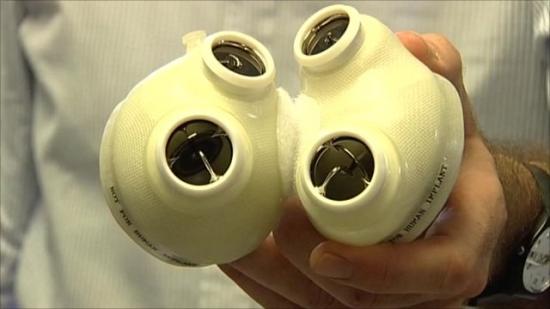40岁的父亲接受人工心脏之后准备出院,曾经一度因心力衰竭跟死神打个照面。

接受塑料心脏的Green病人
Matthew Green在Papworth医院接受心脏移植手术后准备回家,新的塑料心脏是由背包中便携式驱动器供能。他称,新的心脏无疑是生命形式的一次革命。
他是移植完整人工心脏能够出院的首位英国病人,全世界内已经进行过大约900个类似手术。
Matthew的病情急剧下降时,医生讨论给他安装这一装置的可能性,因为他或许没有那么多的时间去等待合适的供体心脏。

新的塑料心脏装置
心胸外科医生Steven Tsui称,没有装置,Green先生无法生存下来。他还说,在Papworth医院,多达30位病人等待心脏移植,其中1/3的病人已经等待了1年。
Green先生称,他是英国大街行人中没有人类心脏的第1人。他结过婚,并有一个儿子,不幸的是患有心律失常性右心室心肌病(ARVC),这一心肌病容易导致心律失常、心力衰竭和瞬间猝死。
Peter Weissberg教授称,对于严重心脏功能不全的患者,移植是长期生存的唯一希望,但是供体心脏往往不易获得。它还补充道,机械心脏的病人必须通过电管接通电源,皮肤上电管刺破位点是潜在的感染源。
对于人工心脏而言,电力装置是如此的小以至于可放置在背包中,病人可自由行走。(生物探索译 Pobee)
生物探索推荐英文原文
Plastic heart gives dad Matthew Green new lease of life
A 40-year-old father who was dying from heart failure is set to leave hospital after receiving an artificial heart.
Matthew Green is ready to go home and await a transplant after surgeons at Papworth Hospital in Cambridgeshire replaced his heart with an implant.
His new plastic heart is powered by a portable driver in a backpack, which he said had "revolutionised" his life.
It is thought to be the first time a UK patient has been able to go home with an entirely artificial heart.
Around 900 similar operations have been carried out around the world.
Mr Green said: "It's going to revolutionise my life. Before I couldn't walk anywhere. I could hardly climb a flight of stairs and now I've been up and I've been walking out and getting back to a normal life.
"I went out for a pub lunch over the weekend and that just felt fantastic, to be with normal people again."
Consultant cardiothoracic surgeon Mr Steven Tsui said without the device Mr Green, from London, might not have survived the wait for a heart transplant operation.
"At any point in time there may be as many as 30 people waiting for a heart transplant on our waiting list at Papworth, with one third waiting over a year," he said.
'Excellent recovery'
"Matthew's condition was deteriorating rapidly and we discussed with him the possibility of receiving this device, because without it, he may not have survived the wait until a suitable donor heart could be found for him."
He said for the first time a patient was walking the streets of Britain without a human heart.
Mr Green, who is married and has a son, had been suffering from Arrhythmogenic Right Ventricular Cardiomyopathy (ARVC), a heart muscle disease that results in arrhythmia, heart failure and occasionally sudden death.
His health had declined over recent years, meaning the only option available to him was a heart transplant.
Earlier, he thanked the Papworth staff for making "it possible for me to return home to my family".
"Two years ago I was cycling nine miles to work and nine miles back every day, but by the time I was admitted to hospital I was struggling to walk even a few yards," he said.
"I am really excited about going home and just being able to do the everyday things that I haven't been able to do for such a long time, such as playing in the garden with my son and cooking a meal for my family."
The SynCardia temporary Total Artificial Heart Mr Green received is used as a bridge-to-transplant for patients dying from end-stage biventricular heart failure, where both sides of the heart are failing.
The device works in the same way as a heart transplant in that it replaces both failing ventricles and the heart valves they contain, thus relieving the symptoms and effects of severe heart failure. However, it is not suitable for long-term use.
Mr Tsui, director of the transplant service at Papworth, said the operation on 9 June "went extremely well".
"Matthew has made an excellent recovery," he said.
"I expect him to go home very soon, being able to do a lot more than before the operation - with a vastly improved quality of life - until we can find a suitable donor heart for him to have a heart transplant."
Mr Green will leave Papworth with a backpack containing a 13.5lb (6kg) portable driver to power his new heart.
Papworth Hospital carries out 2,000 major heart operations a year - more than any other hospital in the UK. The hospital has been using mechanical devices to support patients with end-stage heart failure since the 1980s.
The Total Artificial Heart is a modern version of the Jarvik-7 artificial heart of the 1980s. In November, 1986, a patient received a Jarvik heart and was supported for two days before receiving a transplant.
It is understood that other patients with mechanical hearts have been sent home before, but never with both ventricles replaced.
Health Secretary Andrew Lansley said: "The NHS has a long and proud track record of innovation that has driven major improvements in patient care in the past.
"The success of this procedure at Papworth Hospital is an excellent example of how the NHS can continue to provide the best treatment and outcomes for its patients in the future."
Professor Peter Weissberg, medical director at the British Heart Foundation, said that for some patients, with severe heart failure, transplantation is their only hope of long-term survival, but donor hearts are not always available.
He added: "Patients with mechanical hearts must remain permanently linked to a power supply via tubes that pass through the skin, which is a potential source of infection.
"With this artificial heart, the power supply is small enough to fit in a shoulder bag so patients can walk around and go home."







